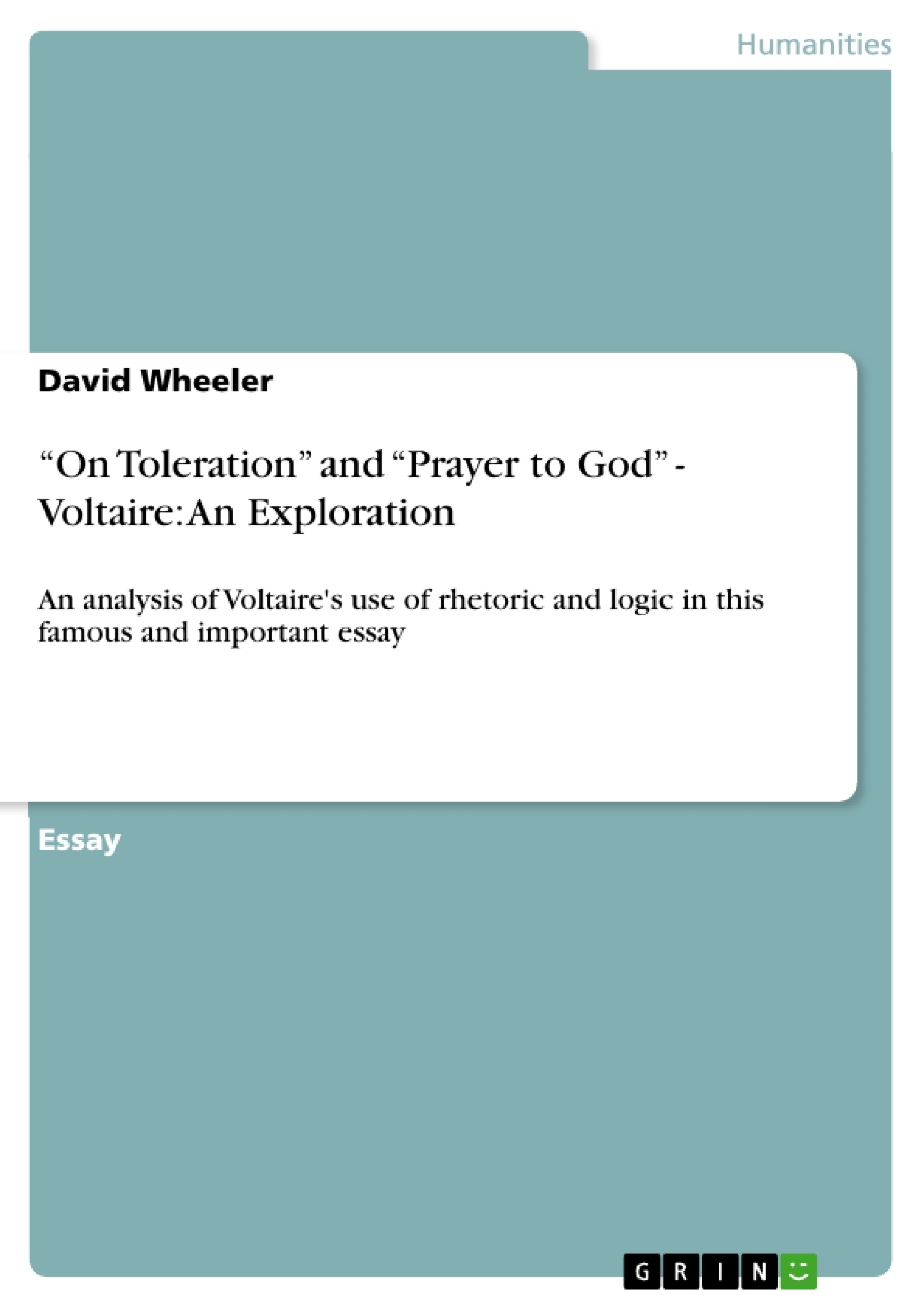Why did Voltaire regard toleration as a virtue and intolerance as a vice?
Voltaire's essay on toleration is a witty, ironic and sometimes satirical piece which uses logic and common sense, and a multitude of examples from ancient history and more modern history, to demonstrate and argue that toleration is a virtue and intolerance is a vice. Voltaire's wit is often conveyed by his disingenuous, straight-faced account of earlier stories about the persecution of early Christian martyrs – accounts which he mocks as fantastical superstitions – superstitions which his argues show that not only is intolerance a vice, but that it is an old-fashioned habit of human behavior which should be eschewed by modern, developed society. His historical scope is wide as is his geographical and cultural sense: he frequently refers to non-European countries in order to show that sectarian fanaticism and intra-Christian violence is a largely European phenomenon. His knowledge of the world and his knowledge of the past impart to the essay a confidence in the benefits of reason, logic and common sense.
Inhaltsverzeichnis (Table of Contents)
- Voltaire’s Essay on Toleration
- The Judicial Murder of Jean Calas
- The Reformation and the Catholic-Protestant Violence
- Tolerance as a Modern Virtue
- The Ottoman Empire and the Toleration of Other Religions
- The Social and Economic Benefits of Toleration
- Ridicule as a Weapon Against Intolerance
- The Right to Disagree and the Rights of the Tiger
- Toleration in Ancient Greece and Rome
- The Stories of Early Christian Martyrs as "Fable[s]" and "Forgeries"
- The Danger of Religious Fanaticism
- The Importance of Public Order
- Intolerance in the Bible
- The Dangers of Intolerance to the Modern State
- Voltaire’s “Prayer to God”
- Trivial Differences and the Importance of Unity
- The Scourge of War and the Products of Peaceful Industry
Zielsetzung und Themenschwerpunkte (Objectives and Key Themes)
Voltaire’s essay “On Toleration” argues that tolerance is a virtue and intolerance is a vice. He uses logic, common sense, and historical examples to show that intolerance is a destructive force that leads to violence, civil unrest, and economic decline. The essay is a call for greater reason and enlightenment in society. Here are some of the key themes of the text:- The Importance of Tolerance
- The Dangers of Intolerance
- The Relationship Between Reason and Enlightenment
- The Role of History in Shaping Society
- The Importance of Public Order
Zusammenfassung der Kapitel (Chapter Summaries)
Voltaire begins his essay by discussing the judicial murder of Jean Calas, a Protestant who was executed for the murder of his son. This event leads Voltaire to examine the phenomenon of interdenominational Christian violence and to argue that such intolerance is a relic of the past that should not be tolerated in the modern era. He then explores the Catholic-Protestant violence that erupted after the Reformation, arguing that this violence is a result of fanaticism and a lack of reason. Voltaire then argues that tolerance is a virtue because it allows for the free expression of conscience and because it contributes to the well-being of the state. He cites examples from the Ottoman Empire, India, Persia, Russia, and China to show that tolerance has been practiced for centuries in non-European societies. He also argues that tolerance is essential for economic prosperity and that intolerance leads to social and economic decline. Voltaire goes on to discuss the historical treatment of early Christians by the Romans, arguing that the church has exaggerated the extent of Roman persecution in order to justify its own intolerance. He then explores the dangers of religious fanaticism, arguing that it can lead to the complete decline of religion. Finally, he concludes his essay with a prayer to God, calling for greater unity and tolerance among humanity.Schlüsselwörter (Keywords)
The main themes of the text revolve around tolerance, intolerance, reason, enlightenment, and the importance of public order. Voltaire’s arguments focus on the dangers of fanaticism, the historical context of religious persecution, and the need for a more tolerant and rational society. Key concepts include the role of history, the benefits of economic prosperity, and the need for social stability.- Quote paper
- David Wheeler (Author), 2012, “On Toleration” and “Prayer to God” - Voltaire: An Exploration, Munich, GRIN Verlag, https://www.grin.com/document/193291




